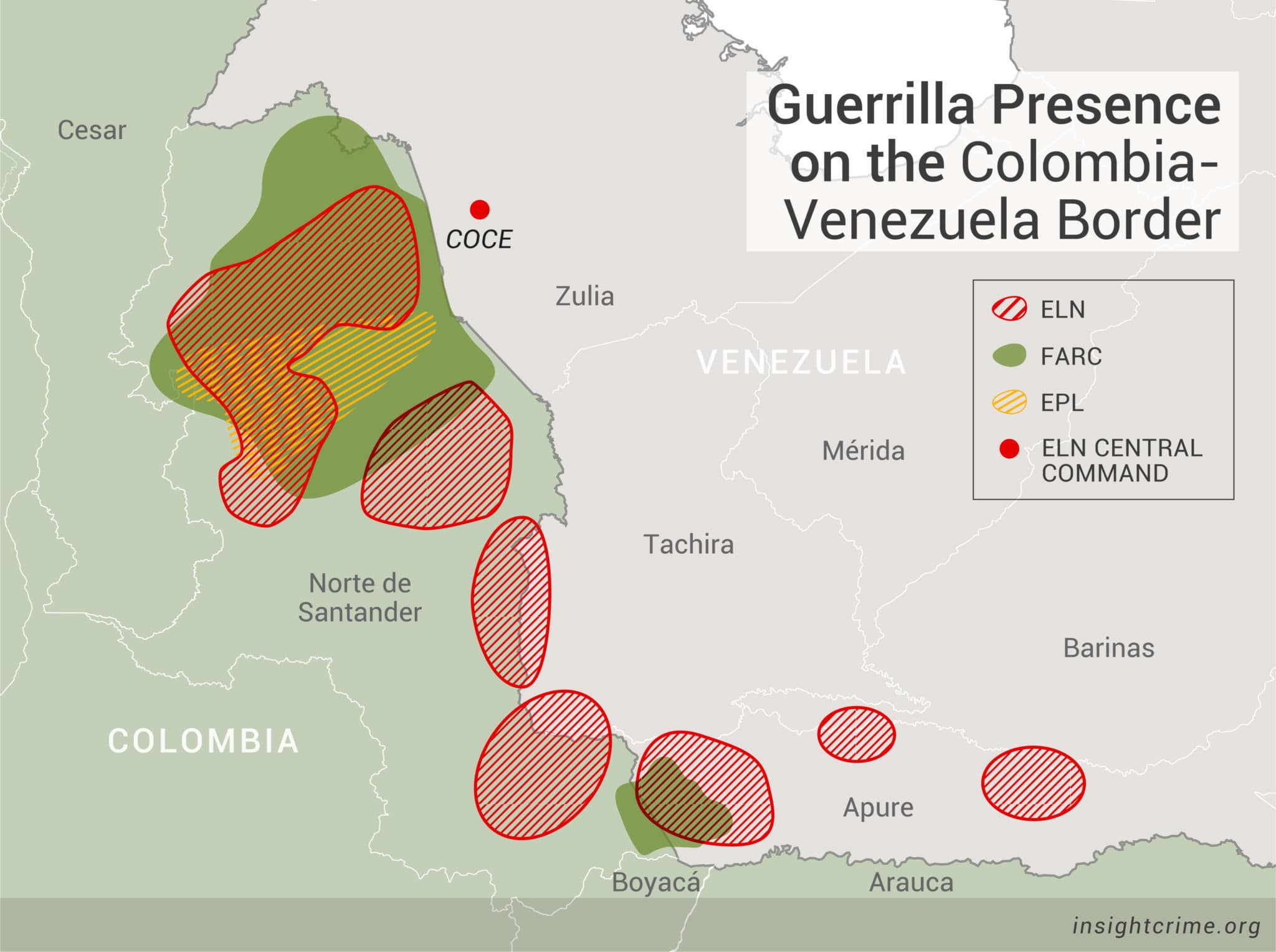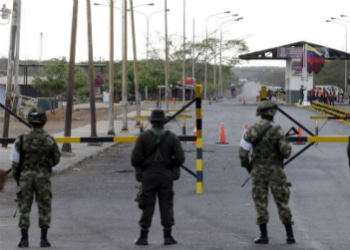Venezuela’s continued spiral into economic, political and social crisis and the demobilization of Colombia’s largest guerrilla group have shifted criminal dynamics on the Colombia-Venezuela border, transforming the region into one of the most important organized crime hubs in Latin America.
The Colombia-Venezuela border region has for years been a hub for criminal activities of all kinds. From drug trafficking to contraband fuel trade and extortion, Colombia’s most powerful organized crime groups have long used the border region, Venezuela’s economic situation and geography to further their criminal enterprises.
Most importantly, Venezuela serves as a fundamental transshipment point for drug shipments consistently trafficked by Colombian organized crime groups and destined for markets in the United States and Europe. Below, InSight Crime breaks down the who and the why of this burgeoning conflict.
Background: Guerrillas, Paramilitaries and BACRIM
Historically, the main actors controlling the border region’s drug market have been the Revolutionary Armed Forces of Colombia (Fuerzas Armadas Revolucionarias de Colombia – FARC), the National Liberation Army (Ejército de Liberación Nacional – ELN) and the Popular Liberation Army (Ejército Popular de Liberación – EPL).

(A 2016 graphic before the FARC’s demobilization c/o InSight Crime)
Contraband smuggling has also been a highly lucrative criminal activity along the Colombia-Venezuela border. After Venezuela closed its border with Colombia in 2015, the illicit trade evolved from a small-scale criminal activity into a thriving illicit economy run primarily by former paramilitary groups, or what are known as “bandas criminales” (BACRIM), like the Rastrojos and the Urabeños who tax smugglers trying to cross the border, among other things.
In addition to an assortment of other products traded on the contraband market along the Colombia-Venezuela border, sophisticated extortion rackets run by Colombia’s paramilitary groups, arms trafficking, kidnappings, the use of the contraband trade to launder dirty money and illegal mining are also prominent.
But as Venezuela sinks further into chaos and Colombia’s criminal world adjusts to the post-FARC era, these traditional dynamics are evolving and becoming more fluid, and the region is beginning to feature different criminal actors.
Detonators: Chaos and Corruption
Venezuela’s continued descent into chaos and the shake up of Colombia’s criminal world after the demobilization of the FARC is causing criminal dynamics along the Colombia-Venezuela border to take new form.
Systemic corruption and criminality within the ranks of Venezuela’s security forces, which President Nicolás Maduro has largely turned a blind eye to, is one factor contributing to these shifts. The Venezuelan non-governmental Fundación Redes recently criticized the loss of a “significant amount” of military weapons and munitions belonging to the Bolivarian National Armed Forces (Fuerza Armada Nacional Bolivariana — FANB) from several border states. According to the foundation, the weapons were delivered to Colombian criminal groups.
This follows recent evidence linking the Venezuelan military to trafficking arms to Colombian rebel groups. In April 2017, Colombian authorities arrested an alleged intermediary of the EPL who was supposedly in charge of acquiring weapons and grenades from Venezuela’s military to provide to the rebel group.
According to Fundación Redes Director Javier Tarazona, the Maduro administration and Venezuela’s security forces, particularly the shadowy groups within the Bolivarian National Guard (Guardia Nacional Bolivariana — GNB) and military commonly referred to as the Cartel of the Suns, are complicit in working with Colombian criminal groups operating on the border.
SEE ALSO: Cartel of the Suns News and Profile
“The ELN and FARC dissidents control the illegal criminal economies on the Colombia-Venezuela border,” Tarazona told InSight Crime. “The Maduro administration allows these groups to operate on both sides of the border and is complicit in their criminal activities. The Cartel of the Suns works with ELN guerrillas and FARC dissidents to move drugs through the border.”
As InSight Crime previously reported, Venezuela’s deepening economic crisis is largely to blame for the armed forces’ increased involvement in criminal activities. With their meager earnings — the highest paid member of Venezuela’s military earns less than $50 per month — lucrative criminal activities are becoming increasingly more attractive to military personnel.
Fuel: Migration and Opportunity
Venezuela’s descent into crisis has also forced an average of 25,000 citizens to flee into Colombia each day, providing a business opportunity for organized crime groups like the ELN and the Urabeños operating in the border region to tax them and even recruit them as cheap labor. More recently, media reports allege that members of Venezuela’s colectivos, pro-government groups armed by the Maduro administration, are now crossing the border into Colombia, which may provide even more opportunities for organized crime groups.
SEE ALSO: Venezuela News and Profiles
According to Tarazona, Colombian criminal groups are recruiting fleeing members of the colectivos, in addition to children and teenagers, to use in their criminal operations. As more colectivo members flee Venezuela and fall into the hands of Colombian criminal groups, Tarazona told InSight Crime that this will “cause more conflict” on the border.
The colectivos have long been associated with violence and have experience handling weapons. They have acted like government proxies in Venezuela, repressing opposition protests and participating in controversial security initiatives.
Organized crime groups could potentially recruit them as mercenaries to help fight for control of lucrative criminal economies in exchange for little pay that would likely still be greater than what they earned in Venezuela. This could lay the groundwork for colectivo members to eventually become assassins, extortionists or drug runners for Colombian criminal groups operating in the border region, and could also impact who ends up assuming control.
While major players like the FARC dissidents, ELN and EPL are still very much active in criminal activities on the Colombia-Venezuela border, BACRIMs like the Rastrojos, thought to be severely weakened after a series of blows to their leadership, are undergoing a resurgence in the border region aided in part by the growing chaos in Venezuela and the fragmentation of Colombia’s criminal world caused by the FARC’s demobilization.
Indeed, according to a December 2017 report from Colombia’s Fundación Progresar human rights organization, other emerging groups, like the Paramilitary Army of Norte de Santander (Ejercito Paramilitar de Norte de Santander — EPN) comprised largely of former Urabeños members, are also trying to expand their operations in the border region. The report found that the EPN’s main source of financing comes from extortion, followed by contraband smuggling, drug trafficking and retail drug distribution.
Fundación Progresar Director Wilfredo Cañizares, who co-authored the December 2017 report, told InSight Crime in an email that, “As things stand now, the groups that could sustain their criminal activities on the border are the Urabeños, Rastrojos and the EPN.”
Prognosis: Systematic Neglect and Violence
The border region is not a main priority for either government, which is likely to exacerbate criminality. The Colombian government is preoccupied with continued struggles regarding the reintegration of former FARC guerrillas, and the ELN are increasingly posing a threat to national security amid the end of a temporary ceasefire. On the other side, the Maduro administration is unlikely to take action to combat criminality on the border given that the armed forces, who are actively participating in criminal activities along the border, are an important pillar of support for his administration.
Nonetheless, criminal dynamics on the border are likely to continue shifting as Colombia’s post-FARC criminal world takes shape and instability in Venezuela continues. The murder of two Venezuelans in the Colombian border town of Cúcuta just one month after they arrived for allegedly not paying extortion fees to a criminal group operating there is a clear example of these changing dynamics, and the violence that is likely to follow.

